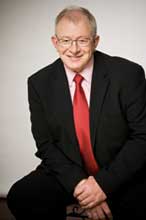"It might look like Afrikaans is currently losing its grip in South Africa, especially in the business world, but that is not true at all. Afrikaans is in fact growing.
"Even though Afrikaans is, for practical reasons, no longer spoken in most boardrooms, it is still a commercial language. Many corporates like ABSA, Sasol and Nedbank to name but a few, still publish their financial results in Afrikaans. There are also many Afrikaans business men in high positions who are very positive about Afrikaans. Take Sanlam as an example. This company, which used to be a 100% Afrikaans company, has joined the global market and only 12% of its policy holders are now Afrikaans. But it has not cut its ties with Afrikaans. On the contrary, it is the biggest sponsor of the Woordfees, which is held annually in Stellenbosch. Sanlam also sponsors the radio station RSG's Afrikaans drama competition.
"Regslui vir Afrikaans and Rekenmeesters vir Afrikaans are constantly creating new legal and accounting terms in Afrikaans. The same with the Woordeboek van die Afrikaanse Taal (WAT). Even in the field of computers and technology Afrikaans is keeping up with new words.

Japie Gouws, managing director of the ATKV group
"There are quite a few Afrikaans organisations whose goal is to promote Afrikaans. Apart from the ATKV, there are the Afrikaanse Taalraad (ATR), Solidariteit, Afriforum and Maroela Media. They haven't thrown in the towel. The ATKV now has over 70,000 members with 312 branches of which three are in Soweto. The branches in Soweto offer Afrikaans lessons to both young and old and these lessons are very popular despite the fact that the students have to pay for the lessons themselves.
"Our projects in schools and universities reach 500,000 children and young people. We also reach those whose home language is not Afrikaans. When we, for example, have a spellathon, we also have a category for the learners who study Afrikaans as an additional language.
"Afrikaans has always been able to create platforms to express itself. Just think of all the art festivals like the Klein Karoo Kunstefees, Aardklop, the Woordfees, the ATKV-Oesfees and the Suidoosterfees.
"Then there is the newly founded Virtual Institute for Afrikaans (VivA) that'll be launched soon. It is a research institute and service provider for Afrikaans in a digital context. VivA's main goal is to increase the use and quality of Afrikaans, locally and internationally, through the description and studying of Afrikaans in its whole context.
"The institute will further develop extensive digital and other resources, facilities and platforms for spoken and written Afrikaans and the offering of Afrikaans language services through technology. The SA Akademie vir Wetenskap en Kuns, the ATKV, North West University and Die Dagbreek Trust are VivA's founder members. The Nederlandse Taalportaal (under management of the Meertens Institute) is an associate member. Prof Gerhard van Huyssteen has been appointed as VivA's first executive officer.
"Nobody can say that there is no effort being made by Afrikaans institutions to promote Afrikaans. The question is, can the Afrikaans-speaking community be mobilised to help the effort?
"It is true that Pendoring Advertising Awards experienced the decline of quality and number of Afrikaans advertisements. That's why the Pendoring board of directors and the sponsors decided to once again focus on the importance of advertising in the target market's home language - specifically Afrikaans advertising. We must educate advertisers, ad agencies and the public to understand the value of Afrikaans as a marketing language and to use it.
"According to various surveys and censuses, Afrikaans-speaking people still have significant buying power. Businessmen shouldn't ignore this fact. The problem is however, that if Afrikaans consumers are not concerned whether Afrikaans vanishes as an advertising language then there is nothing that will stop the decline of Afrikaans advertisements.
"If Afrikaans people keep on sending their children to Afrikaans schools and universities, if they keep on supporting Afrikaans movies, shows and writers, then Afrikaans will not lose its status as a highly functional language. On the contrary, Afrikaans has the potential to keep on growing in the next 50 years. Afrikaans people should not give up hope, but should rather join in and support all efforts," urges Gouws.